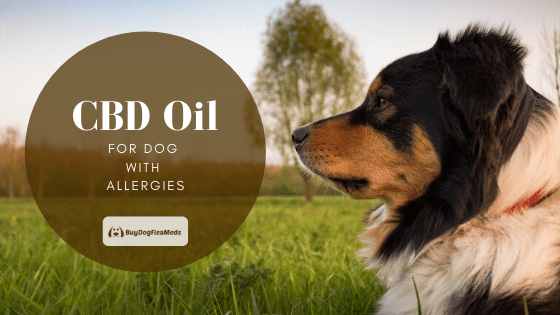CBD Oil for Dog Skin Allergies – What You Need to Know
Some things like laundry detergent, pollen, or peanuts are usually harmless. When your pet’s immune system overreacts to one or some of these things, you can say that your pet is “allergic” to them.
Common causes of skin allergies usually fall under certain groups:
- Food and what is in it, including preservatives, additives, food storage mites, and food dyes
- Things that come into contact with your pet’s skin, including wool, soaps, fleas, and dust mites
- Pollen, cigarette smoke, dust from carpets, dander, chemical preservatives, cleaning products, or treatments sprayed on decks or floors, and other things that your pet may breathe in.
Types of Skin Allergies
Dogs and cats may experience different types of skin allergies.
- Flea allergy dermatitis
When your cat or dog is allergic to fleabites or flea saliva, he is said to have flea allergy dermatitis.
Flea allergy dermatitis makes cats or dogs extremely itchy, especially behind their ears or at the base of their tails. The skin becomes inflamed, red, and scabbed. Sometimes, you may notice the fleas themselves or flea dirt on certain parts of your pet’s body.
- Food allergies
When your pet is highly sensitive to certain foods, this sensitivity can result in itchy skin, particularly in the areas around his paws or ears. It can also trigger chronic foot or ear infections, facial inflammation (especially of the lips, earflaps, eyelids, or throat), hives, or unhealthy skin or coat.
Gastrointestinal symptoms in the form of diarrhea or vomiting can sometimes come with food allergies.
- Atopic allergic reactions to the environment
Mold, pollen, and dust are some environmental allergens that can cause allergic reactions in pets. These allergies are usually seasonal; your pet may itch only during particular times of the year.
Similar to food allergies, allergens usually affect your pet’s ears or paws although they may also sometimes affect areas like the underarms, ankles, groin, wrists, muzzle, and the areas in between your pet’s toes and around his eyes.
When your pet is prone to skin allergies, he is also at risk for secondary infections. The skin becomes vulnerable to bacterial infections and yeast, conditions which may require a visit to the veterinarian.
- Acute allergic reactions
These reactions are rare. Some pets may have an alarming severe reaction to allergens like vaccines or bee stings. They may show an anaphylactic response and go into shock. Seek immediate treatment for your pet when this occurs.
Symptoms of Skin Allergies in Dogs and Cats
Generally, you will know that your pet has skin allergies when you see one or more of the following symptoms:
- Red, inflamed skin
- Itchy back or tail base
- Hives
- Chronic ear infections
- Sneezing
- Red, runny eyes
- Coughing
- Wheezing
- Snoring (usually as a result of an inflamed throat)
- Behaviors like continuous licking, chewing of paws, scratching, pawing at ears, or shaking of the head
- Bald spots
- Hair loss
- Rashes on the abdomen, face, ears, toes, base of tail, or feet
- Vomiting
- Diarrhea
Some of these signs can also be an indication of another problem or condition. It is better to consult your veterinarian so he can properly diagnose your pet’s condition and start treatment for relief immediately.
Ailments Associated with Skin Allergies
Skin allergies are associated with certain ailments in cats and dogs.
They are associated with skin disease, a common ailment that is usually characterized by an unattractive coat, lesions, crusting, and, sometimes, discharge and pus.
They are also associated with hot spots characterized by the sudden onset of acute, localized, and very painful skin inflammation, usually on areas around the flank and ears.
Skin allergies are also associated with excessive shedding and hair loss.
How to Prevent Skin Allergies in Dogs and Cats
Fleas are the most common cause of skin allergies in pets. Before the start of the flea season, take all precautionary measures to help your pet avoid fleas.
A pet that gets exposed to fleas outside can carry the fleas inside and infect all other pets. Ask your veterinarian for his recommendations for effective flea control products.
Use litter that is unscented and dust-free. Scented litter may contain chemicals that your pet may be allergic to.
Dust is another common cause for skin allergies. Wash your pet’s beddings once a week. Vacuum at least twice a week curtains, rugs, and other materials that are prone to collect dust.
Bathe your pet once or twice a week to relieve itching. Bathing also helps to get rid of pollen, fleas, and other environmental allergens that may stick to your pet’s coat. Use a very mild shampoo for bathing your pet to avoid drying out his coat and skin.
If a food allergy is suspected, put your pet on a hydrolyzed or prescription protein diet. Consult your veterinarian; he will probably recommend a safe home-cooked diet or specific non-allergenic foods.
Natural Home Remedies for Pets’ Skin Allergies
You can use the following home remedies to prevent or address your pet’s skin allergies:
- Get rid of fleas.
When vacuuming, put a flea collar inside the bag of your vacuum cleaner. This will ensure that the fleas you vacuum will stay put in the bag.
If you hesitate to use a flea collar because of the insecticides, use safe and natural alternatives like rosemary, cedar, marigold, and lemongrass to deter fleas.
Bathe your pet with limonene shampoo. While he is still in the water, thoroughly flea-comb him so the fleas drown in the water.
Prepare your pet’s drinking water by mixing in about a teaspoon of vinegar for every quart of water. The mixture keeps your dog or cat free from ticks and fleas but will not harm him in any way.
Dust the crevices of chairs and couches with borate powder.
- Replace plastic food bowls with those made of glass, stainless steel, or ceramic. Be meticulous about keeping them clean.
Plastic food bowls can hide bacteria in their tiny cracks. The plastic material may contain allergens which may cause adverse reactions like hot spots, acne, pimples, or rashes around your pet’s chin and lips.
- Use an oatmeal soak to relieve your pet’s itchy skin.
Make a mixture of water and oatmeal. Rub the paste on your pet’s skin to reduce dryness and relieve itchiness. Leave the paste on his skin for 10 to 15 minutes before rinsing off with warm water.
- Use a wet towel to remove allergens.
Use a wet towel to wipe down your pet, especially when he comes in from playing outside. This simple act will remove the allergens and prevent his skin from absorbing or reacting to them.
Treatment for Your Pet’s Skin Allergies
Your veterinarian is likely to suggest the following treatments:
- Proper nutrition
Feed your pet with nutritious food to strengthen his immune system and help him cope with allergens. See to it that his diet includes the essential fatty acids Omega 3 and Omega 6, as well as brewer’s yeast.
Your veterinarian is likely to recommend diet change when necessary. Consider your pet’s food sensitivities when planning what food to give him. Consult your veterinarian about giving your pet probiotics or prebiotics.
- Ectoparasite control
Prevent ticks or fleas from giving your pet skin allergies.
- Hygiene
Groom and give your pet regular baths. Change his beddings on a regular basis.
- Medication
Some veterinarians suggest immunotherapy as a treatment.
This technique involves giving your pet small quantities of allergens by injection and gradually increasing the amount over a certain period of time.
Immunotherapy aims to retrain the immune system so that, in time, your pet becomes increasingly less reactive to the allergens.
Other options include immune modulators, steroids, and antihistamines.
- CBD Oil
Extracted from the cannabis plant, CBD oil has proven to have healing and therapeutic properties. It is a strong anti-inflammatory treatment and helps to soothe the swelling and itchiness caused by skin allergies.
CBD oil has been shown to be effective not only for treating skin allergies in cats and dogs, but also for providing therapeutic or preventive intervention.
How Much CBD Oil Should You Give Your Pet for His Skin Allergies?
The basic CBD oil dosage recommended for skin allergies is between 1 and 5 mg of CBD/10 pounds of body weight. You can check my CBD Dosing chart for dogs page for more info.
References
- https://www.oregonvma.org/care-health/companion-animals/allergies-skin-issues-pets
- https://www.1800petmeds.com/education/allergies-dog-cat-9.htm
- https://pets.webmd.com/cats/cat-allergy-symptoms-triggers#1
- https://www.almanac.com/content/home-remedies-pets
- https://www.1800petmeds.com/education/pet-medications-common-skin-problems-9.htm
- https://www.allthebestpetcare.com/pet-nutrition/cbd-dose-dog-cat/

